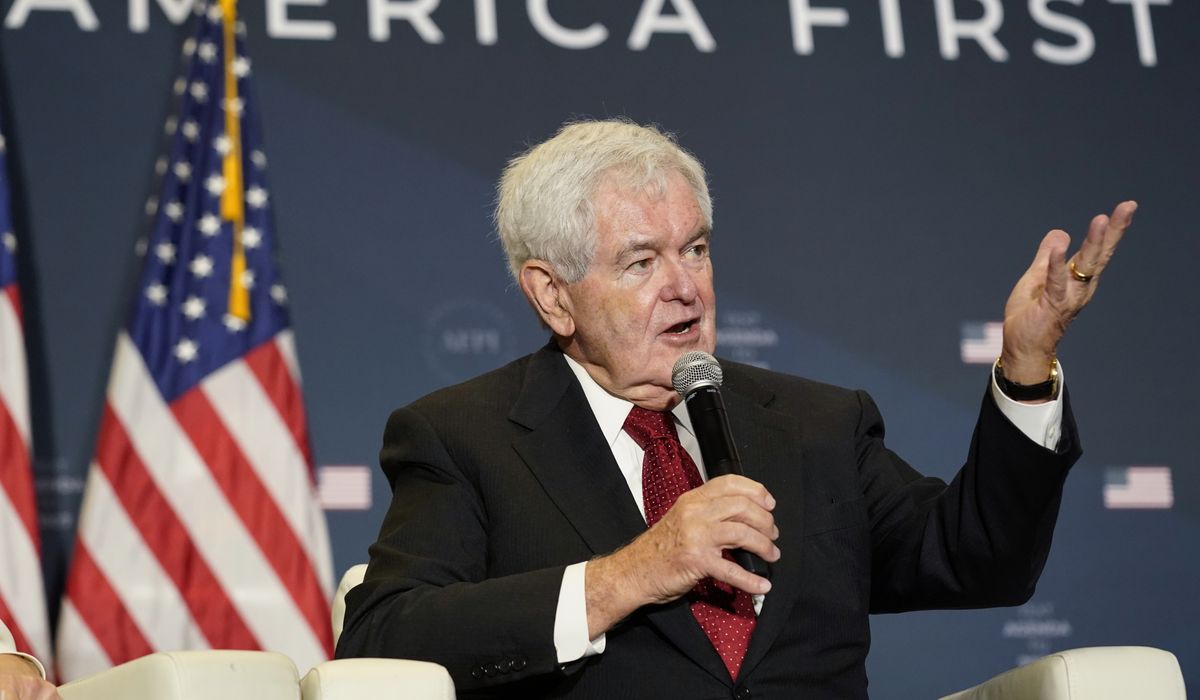


Former President Donald Trump’s seemingly tough public stance on U.S. troops in South Korea is part of a negotiating strategy and does not mean Mr. Trump would pull all American forces from the Korean peninsula, former House Speaker Newt Gingrich said Tuesday.
Speaking at “The Washington Brief,” a monthly forum hosted by The Washington Times Foundation, Mr. Gingrich was asked about recent comments from former Trump administration officials, and Mr. Trump himself, that have fueled concern about whether the U.S. could remove its force of about 28,500 troops from South Korea.
Mr. Gingrich said Mr. Trump would not leave South Korea undefended. What’s more, the former House speaker said, Mr. Trump has a unique understanding of the threat posed by North Korea because of his three face-to-face meetings with North Korean leader Kim Jong-un.
The former president simply wants South Korea to pay more for its own defense, Mr. Gingrich said.
“He’s willing to share the burden, but he’s not willing to carry the burden by himself,” he said of Mr. Trump. “But I don’t think he has any interest in leaving South Korea undefended. And I think he understands South Korea is a key linchpin, as is Japan, to preserving American interest in the region.
“To in any way send a signal to Kim Jong-un that an attack on South Korea would be acceptable would be suicidal,” Mr. Gingrich continued. “And Trump fully understands — he’s met with Kim Jong-un.”
The future of U.S. troops in South Korea under a theoretical second Trump term came into the spotlight because of recent comments by Mr. Trump and by Elbridge Colby, a former deputy undersecretary of defense for strategy and force development during the Trump administration.
“If you are assuming that the United States is going to break its spear, if you will, fighting North Korea, that is an imprudent assumption for us to make or for you to make,” Mr. Colby told Yonhap News Agency, a major South Korean news service, last month. “South Korea is going to have to take primary, essentially overwhelming responsibility for its own self-defense against North Korea because we don’t have a military that can fight North Korea and then be ready to fight China.”
Mr. Trump also raised concerns with his own comments about the future of U.S. troops in South Korea — though his remarks were in line with his longstanding position that American allies should pay more for their own defense.
“Why would we defend somebody? And we’re talking about a very wealthy country,” Mr. Trump told Time magazine in a recent interview.
“But they’re a very wealthy country and why wouldn’t they want to pay?”
Under the current U.S.-South Korea cost-sharing agreement, which expires at the end of 2025, South Korea agreed to increase its payments in 2021 by 13.9%, according to The Associated Press. That equates to about $1 billion. In each year after 2021, South Korea’s contribution increase was tied to the annual increase in the country’s overall defense budget.
Under the current deal, South Korea pays about 44% of the total cost of the U.S. military presence in the country, according to AP.
Beyond the numbers, Mr. Gingrich said it makes strategic sense to keep American forces on the Korean peninsula.
“If your interest is stability in east Asia, they’re probably located as well as they could be,” he said.
• Ben Wolfgang can be reached at bwolfgang@washingtontimes.com.
